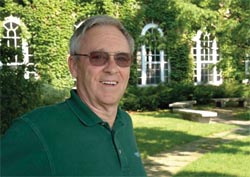by Mary Catherine Coolidge ’93
When I first encountered Shakespeare’s plays in college, it was as if my mind had found a place to live. Hamlet, RichardIII, HenryV, King Lear—these works changed my interior landscape from black and white to Technicolor. Shakespeare blew the lid off what I had known and understood about the bewilderment, love, and loss that make up man’s existence, but his plays were also mirrors in which I saw, for the first time, the not always innocent machinations of my own ego.
I studied Shakespeare with Dr. Henry Vittum, professor of literature at Plymouth State College, who also taught my advanced composition class. And though he would probably admonish the hyperbole, Dr. Vittum taught me nearly everything I know about critical thinking and writing well.
As students, we had to keep a journal, which we’d turn in on a weekly basis. Dr. Vittum’s return comments, written in distinctive penmanship along the margins of our pages, would prod us along in our understanding of the plays. It was an intimate, liberating dialogue between professor and student.
After writing last week’s “True Lies” column, I continued to grapple with the idea of speaking the truth when negative ramifications are likely. Thumbing through my dog-eared copy of King Lear, I found Lear’s warning to his daughter Cordelia: “Mend your speech a little, Lest it may mar your fortunes.” I felt a dullness in my gut when I recalled how I had so easily done for professional aspirations what Cordelia so steadfastly would not do for familial ones.
I dragged out my college notebooks and flipped through the yellowing pages of my Shakespeare journal until I found my writings on Cordelia’s conundrum. Was it nobler, I had asked, to be a Cordelia, who speaks plainly and honestly but is banished by her father, or be a Kent, who, through self-disguise and some deceit, preserves his proximity to the king he loves. At the end of my entry, I’d scribbled, “I can’t say which path is best.”
Dr. Vittum’s response hit me harder this time around. “You can’t be both a Cordelia and a Kent,” he had written. “Unfortunately, the choice must be made.”
In another entry, I had earnestly, if somewhat dramatically, railed against the difficulties of choosing how to live: “Oh, Dr. Vittum, I wonder if it’s even possible to live one’s life with unfaltering integrity!”
In his response, Dr. Vittum gave a rare glimpse of his private self: “I believe with all the strength of my being that it is possible ‘to live one’s life with unfaltering integrity.’ It has been my life’s standard.”
His response was one of the few definitive and sure answers I’ve ever received, before or since, from anyone about anything. So few of us know what we believe, much less believe with such conviction.
Those classes are long ago now, but Shakespeare has become a constant friend and teacher. His words have never let me down. They’ve never stopped stopping me in my awestruck tracks with their mastery of language and insight into human nature.
I rarely read in bed, but in times of true sadness or confusion, I’m known to tuck whatever Shakespeare I’m reading under my pillow before going to sleep. Silly, I know, but his words offer such comfort in times of loss or worry that I can’t help but want them close.
Those who teach give gifts not just of education but of opportunity. Teachers painstakingly draw out and cultivate the best aspects of a growing mind and spirit. A few teachers have the special gift of imparting a sense of hope and faith to their students, even when the rest of the world seems bleak and dark.
My world, while not exactly dark before I went to college, was certainly less filled with light. All the professors at my college turned on lights in rooms of my mind I didn’t even know existed. But it was Dr. Vittum who, through his careful and gentle teaching of Shakespeare, showed me a light that would illuminate my spirit.
I was just one of many students, but I hope somehow my professor knows what a gift his teaching was to me and that his gift is with me still.
Mary Catherine Coolidge ’93 is a weekly newspaper columnist and magazine contributor in Sarasota, Florida.She writes for businesses and non-profits in Boston,NYC,DC,and Florida.Her weekly column, where this essay first appeared,is called “RealityChick,” and may be read online at www.pelicanpress.org.









